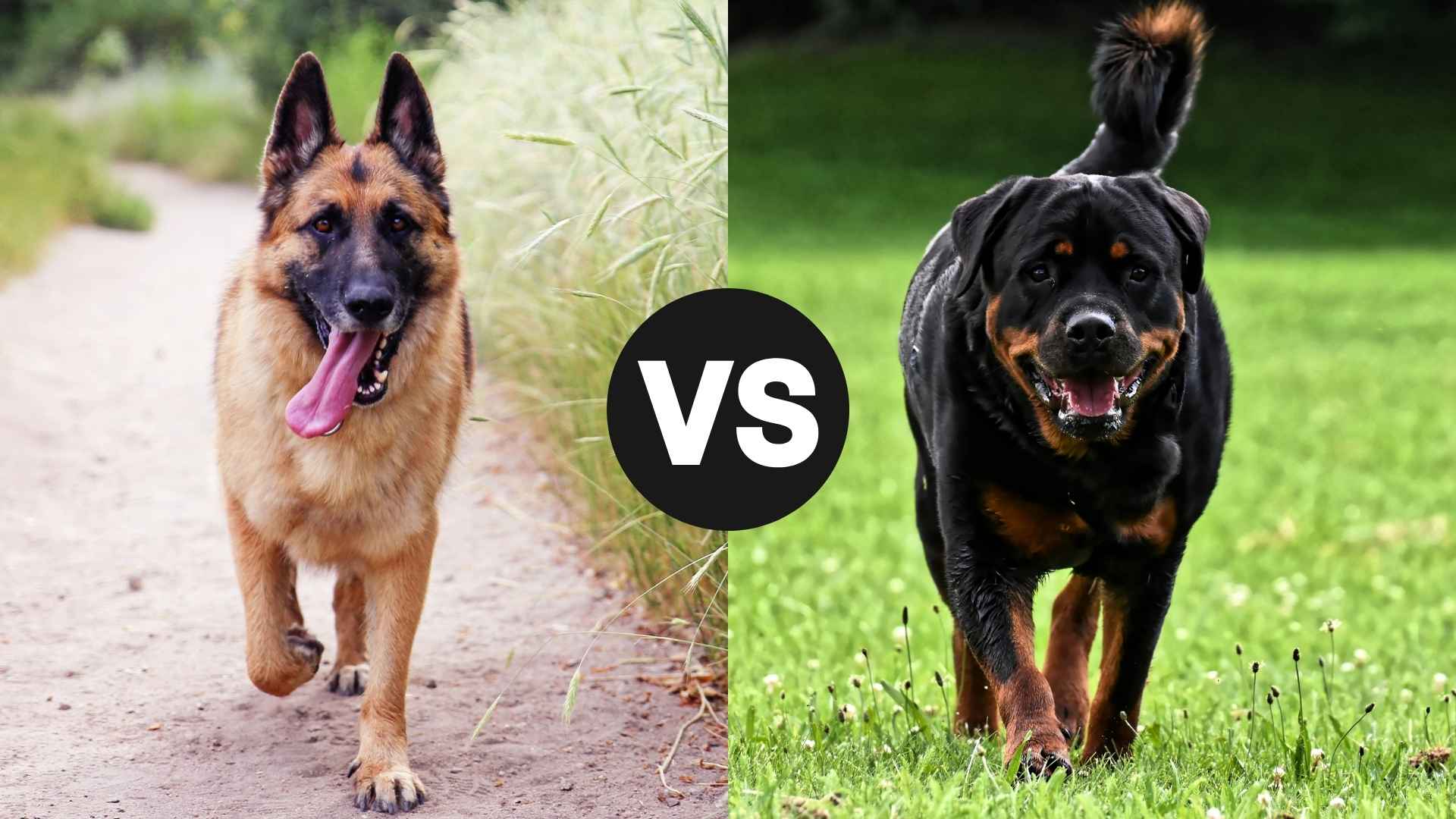The German Shepherd and the Rottweiler are two of the most popular and powerful dog breeds, often admired for their intelligence, strength, and loyalty. While both breeds are excellent companions and protectors, they have distinct traits that make them better suited for different lifestyles.
A German Shepherd is highly trainable, energetic, and great for active families, while a Rottweiler is strong-willed, confident, and naturally protective. Whether you’re looking for a devoted family pet, a working dog, or a guardian, understanding their differences in temperament, training, and care needs is essential.
In this detailed comparison, we’ll break down everything from personality and exercise requirements to health concerns, helping you make an informed decision. Read on to discover which of these majestic breeds is the perfect fit for your home and lifestyle!
German Shepherd vs. Rottweiler
The German Shepherd originated in Germany in the late 19th century, developed by Captain Max von Stephanitz to be the ideal herding and working dog. Known for their intelligence, loyalty, and versatility, they quickly became popular as police dogs and military dogs, excelling in search-and-rescue and protection work.
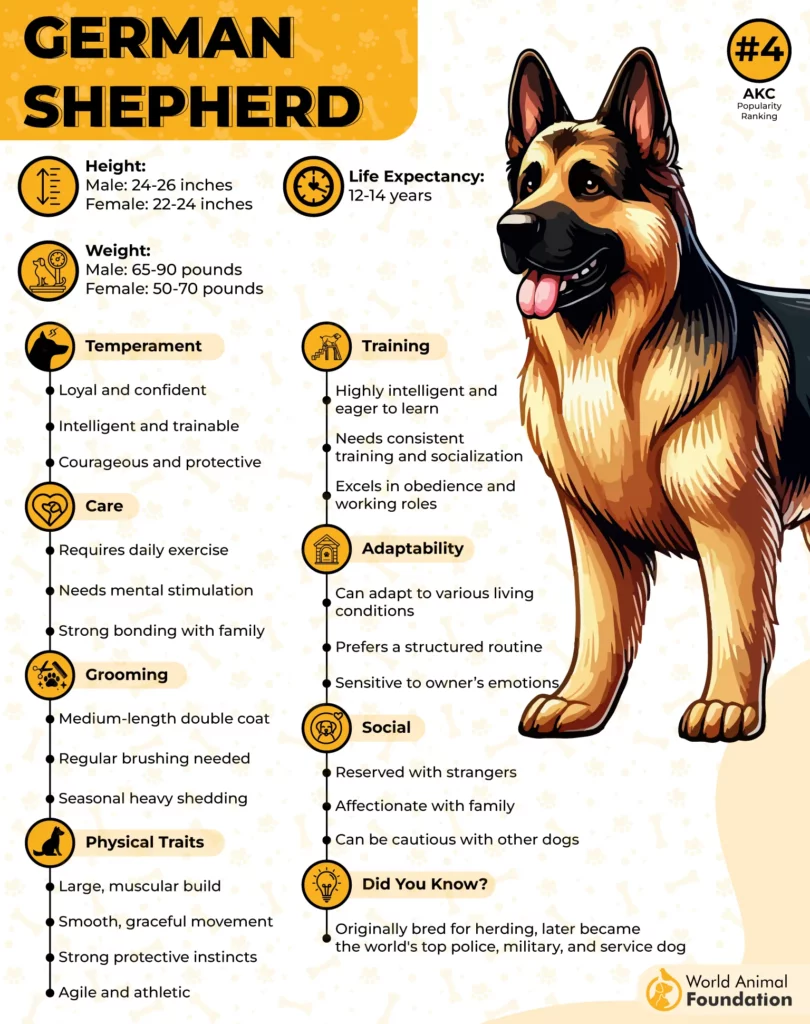
Their ability to learn commands rapidly and strong protective instincts make them a favored breed for service roles worldwide. Over time, they have also become cherished loyal companions, known for their deep bond with their owners and natural guarding abilities.
Rottweilers trace their history back to ancient Rome. As the Romans traveled through Europe, these dogs helped drive cattle and protect goods, eventually settling in the town of Rottweil, Germany, where they became known as butcher’s dogs, assisting in livestock management and pulling carts.
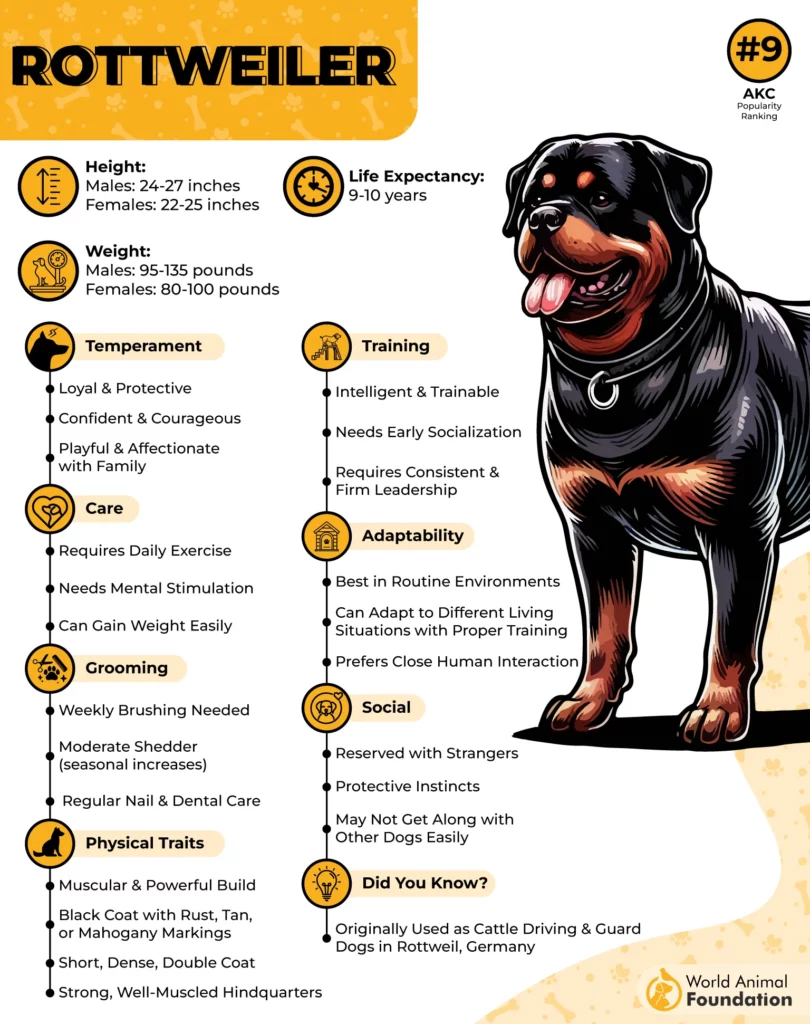
Their strength, endurance, and natural protective instincts have made them popular working dogs for law enforcement and personal protection.
Both the Rottweiler and German Shepherd are known for their guarding abilities, but Rottweiler owners must provide firm training to prevent stubborn tendencies. Despite their imposing appearance, Rotties are incredibly loyal, forming strong bonds with their families while remaining highly vigilant.
With the right training and structure, they can be calm and well-mannered in the house, though they are known to bark at perceived threats, making them excellent watchdogs.
German Shepherd vs. Rottweiler: Size
The German Shepherd is a large, well-proportioned dog with a strong, athletic build. Males weigh between 50 to 90 pounds and typically stand 24 to 26 inches at the shoulder, while females range from 22 to 24 inches.
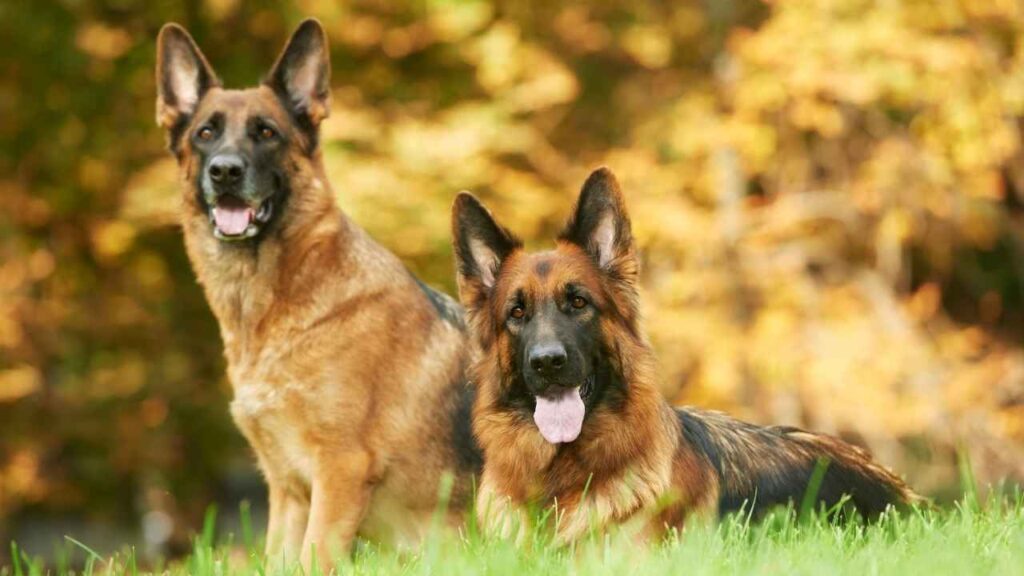
Their lean yet muscular frame supports their agility and endurance, making them excellent working and service dogs. Known for their slightly elongated body, German Shepherds have a commanding presence that enhances their suitability for various roles.
Rottweilers tend to have a bulkier build with a solid, muscular physique. Males generally reach a height of 24 to 27 inches, while females stand between 22 to 25 inches. Their weight ranges from 80 to 135 pounds, making them significantly heavier than German Shepherds.

With broad chests, thick bones, and a powerful stance, Rottweilers exude strength and confidence, ideal for guarding and protection roles.
German Shepherd vs. Rottweiler: Strength Comparison
The German Shepherd is known for its agility, endurance, and bite force, making it an excellent working and protection dog. With a bite force of around 238 PSI (pounds per square inch), it has a strong grip, though not the most powerful among dog breeds.

What sets the German Shepherd apart is its speed, intelligence, and ability to take down threats using strategic movements rather than sheer force. Their lean yet muscular build allows them to excel in police and military work, where agility and obedience are crucial.
Rottweilers, in contrast, are built for raw power and sheer strength. With a bite force of approximately 328 PSI, they have one of the most powerful bites among domestic dogs. Their stocky, muscular frame allows them to exert tremendous force, making them excellent guard dogs.
Unlike the German Shepherd, which relies on speed and technique, the Rottweiler’s strength lies in its brute force, capable of easily overpowering intruders.
German Shepherd vs. Rottweiler: Intelligence Comparison
The German Shepherd is regarded as one of the most intelligent dog breeds, ranking third in canine intelligence. Known for their quick learning abilities and problem-solving skills, they excel in obedience training and complex tasks.
Their intelligence and eagerness to please make them highly trainable for police work, search and rescue, and service roles. They can learn new commands in just a few repetitions and respond reliably, making them ideal for such roles. German Shepherds are praise-motivated and excel in obedience training.
Rottweilers are also highly intelligent but tend to be more independent and strong-willed. Ranked ninth in canine intelligence, they are quick learners but require consistent training and firm leadership.

Rottweilers have a more dominant personality and may challenge authority if not properly trained. Their intelligence is best suited for guarding, protection, and working roles where their problem-solving skills and natural instincts can be used.
German Shepherd vs. Rottweiler: Aggression Comparison
The German Shepherd is a naturally protective and alert breed, but its aggression is usually controlled and purposeful. With training and socialization, German Shepherds are obedient and only show aggression when necessary, such as in protection or working scenarios.
Their strong bite force and high intelligence allow them to assess threats carefully before acting, making them ideal for police and military roles. However, without proper training or socialization, they can develop fear-based aggression, especially toward strangers or unfamiliar situations.
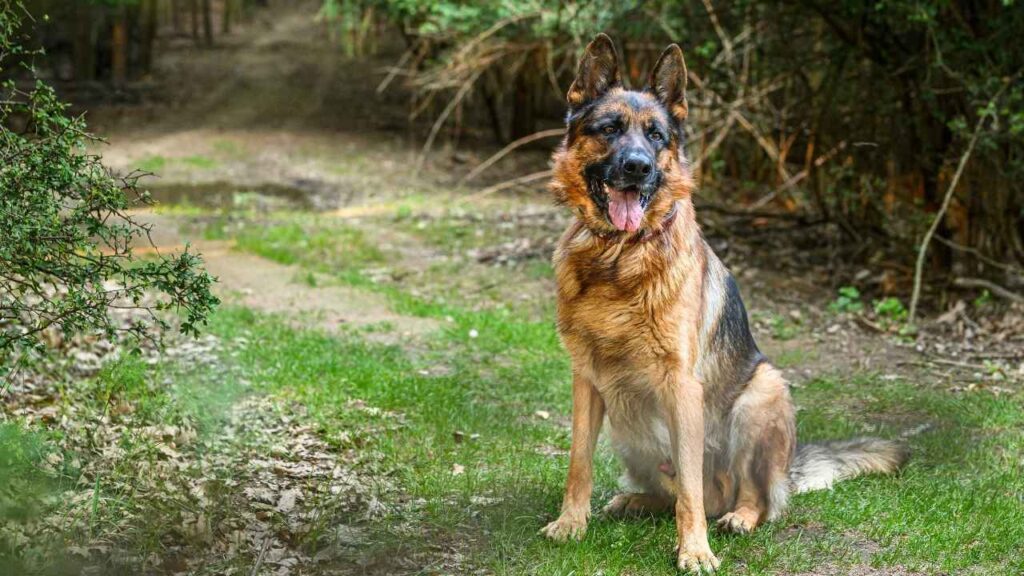
Petplan states that Rottweilers have a naturally dominant and territorial personality, making them one of the most formidable guard dogs. They are known for their strong protective instincts and can be more aggressive than German Shepherds if not properly trained.
With their powerful build and intense bite force, Rottweilers require firm leadership and early socialization to prevent overprotective or aggressive tendencies. When raised in a structured environment, they become loyal and affectionate family dogs but remain highly vigilant against perceived threats.
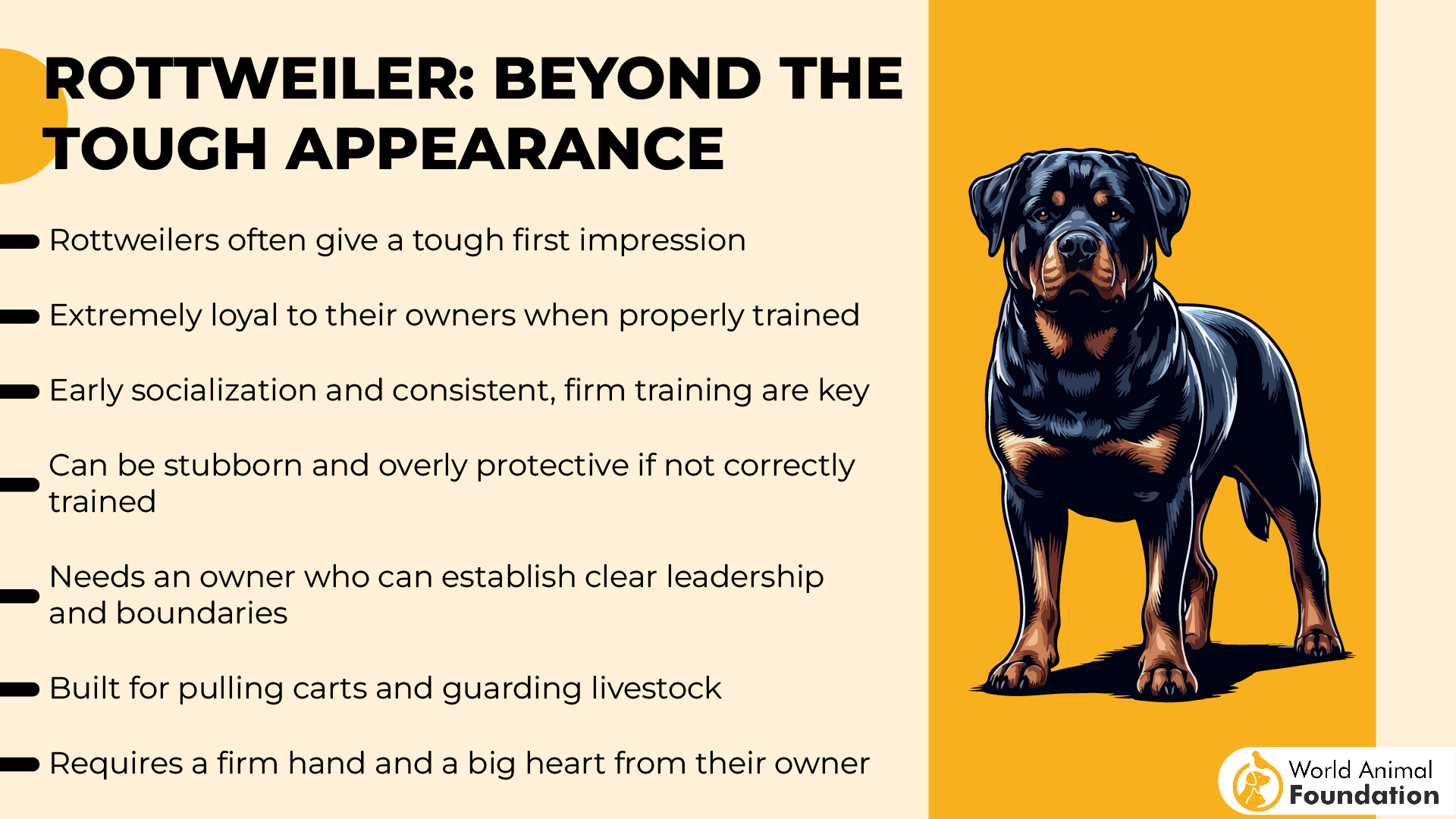
German Shepherd vs. Rottweiler: Health Comparison
German Shepherds and Rottweilers are generally strong and resilient breeds, but they have distinct health issues that owners should be aware of.
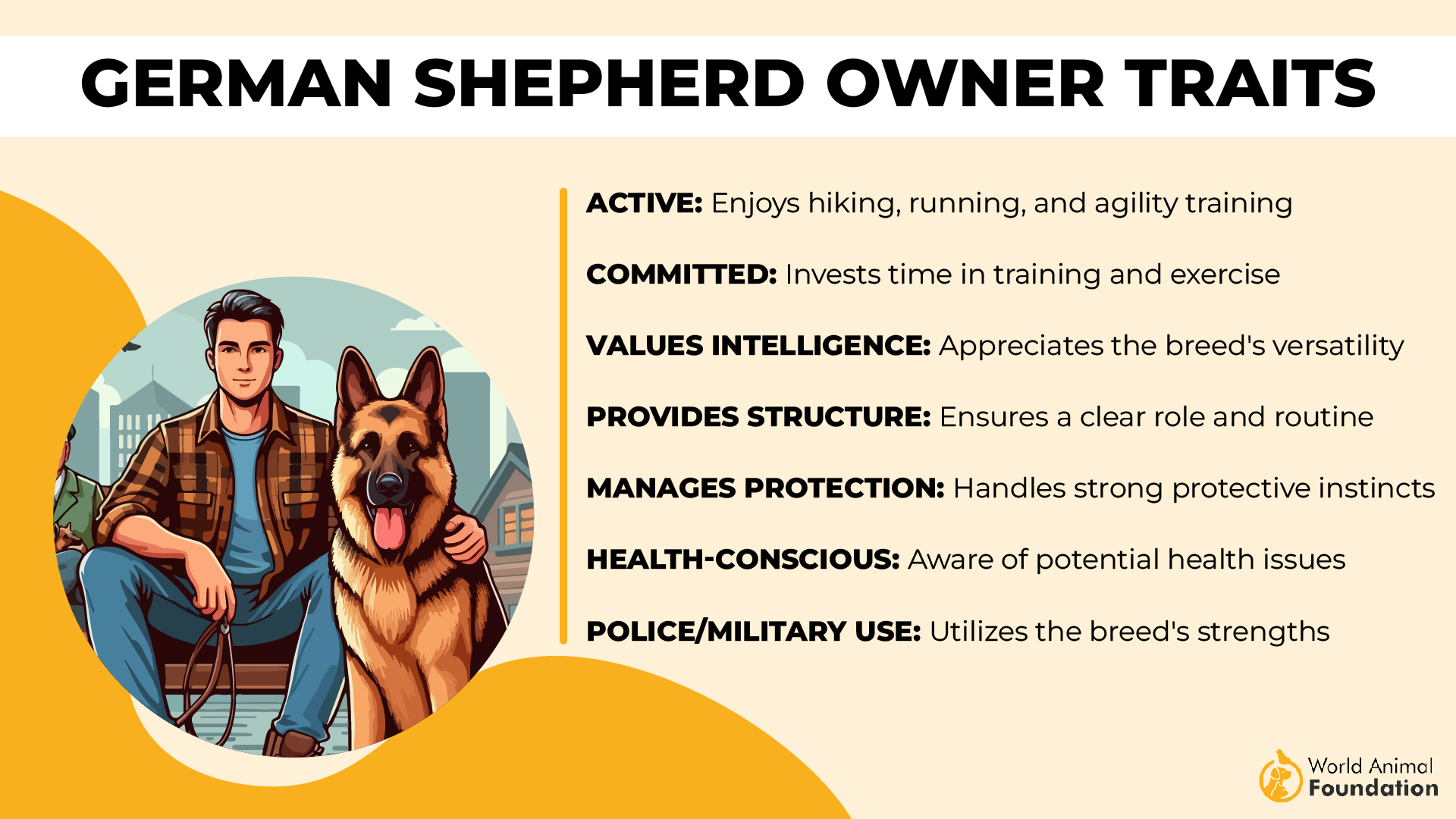
As per PetMD, German Shepherds are more likely to develop degenerative myelopathy, a progressive spinal disease. German Shepherds often struggle with bloat (gastric torsion), exocrine pancreatic insufficiency (EPI), and allergies that can lead to chronic skin conditions.
Weight gain is another concern, especially in under-exercised dogs, as it can exacerbate existing common health issues such as joint pain and heart disease.
Rottweilers are more prone to certain cancers, including osteosarcoma (bone cancer), which can significantly impact their lifespan. PDSA states that this breed is also at risk for heart conditions, particularly dilated cardiomyopathy and aortic stenosis, both of which affect blood flow and heart function.

Both breeds require regular exercise to maintain joint health and prevent weight gain, which can worsen orthopedic issues and heart-related conditions. A lack of activity can leave both breeds at increased risk of obesity and behavioral issues.
Additionally, both breeds can suffer from separation anxiety if left alone for long periods, which may affect their overall well-being. Proper diet, supplements, and regular vet check-ups are essential for both breeds to ensure a healthy and active life while promoting overall wellness.
German Shepherd vs. Rottweiler: Lifespan Comparison
German Shepherds typically live between 9 to 13 years. Their longevity depends on factors like diet, exercise, and genetic predispositions. They are prone to hip dysplasia, degenerative myelopathy, and other joint-related issues, which can impact their lifespan.
Rottweilers generally have a shorter lifespan, ranging from 8 to 10 years. Being a larger and more muscular breed, they are susceptible to conditions like hip and elbow dysplasia, heart disease, and certain cancers, which can reduce their overall life expectancy.
On average, German Shepherds tend to live slightly longer than Rottweilers. Proper care, a balanced diet, and regular vet check-ups can help both breeds live healthier, longer lives.

Conclusion
Choosing between a German Shepherd and a Rottweiler in this ultimate showdown comes down to lifestyle, experience, and preference. Both are working breeds known for their intelligence, loyalty, and protective instincts, yet they have individual personalities that suit different owners.
For families, both breeds can be family-friendly with proper training, though German Shepherds may be more adaptable to homes with small children. Rottweilers, on the other hand, are devoted, loving companions but require strong leadership and socialization.
Their grooming needs also differ—German Shepherds shed more and require regular brushing, while Rottweilers have lower maintenance coats.
Ultimately, it makes sense to consider factors like space, mental stimulation, diet, and exercise before bringing one of these large breeds home. Reputable breeders can provide insights into health and temperament, ensuring the best fit for your lifestyle.
Whether you choose a pup that thrives on rigorous training or one with a strong guardian instinct, both breeds are exceptional animals that can become devoted companions when given the care and commitment they deserve.


